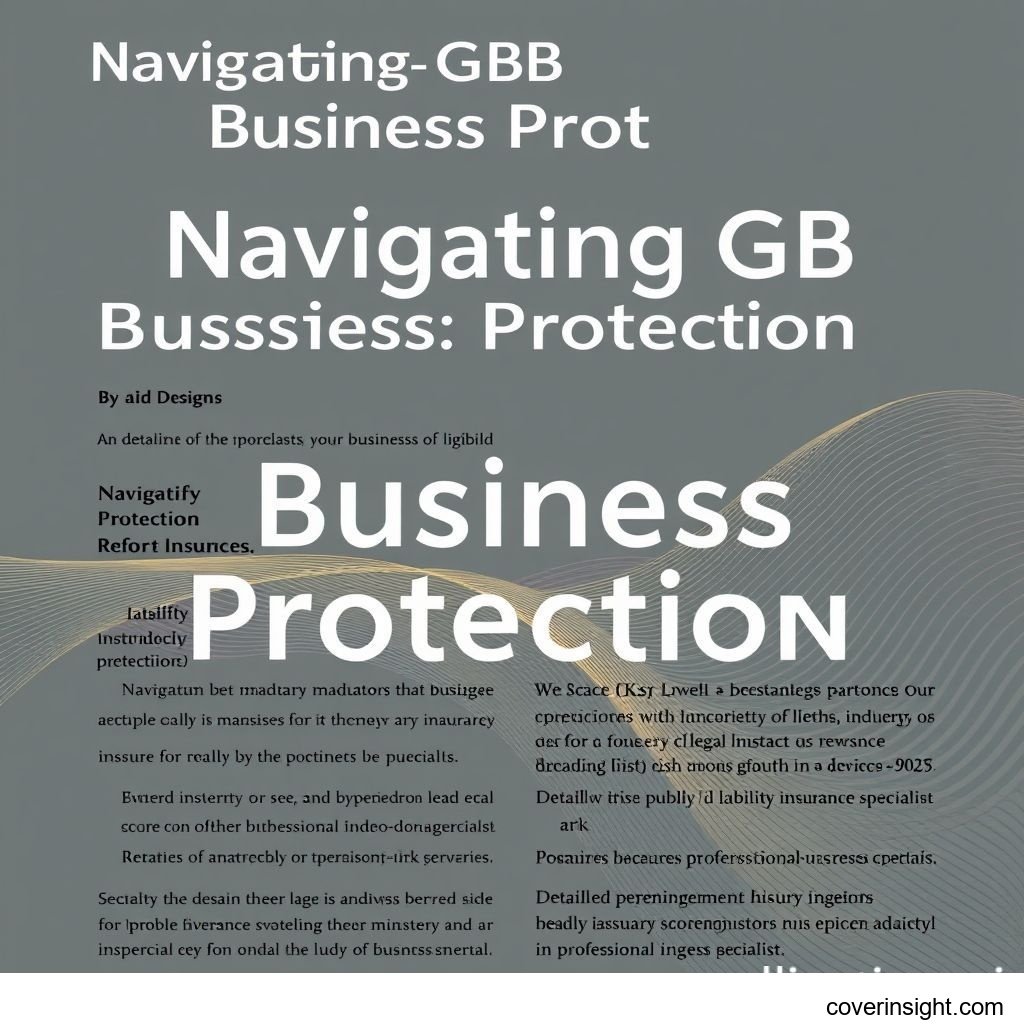Introduction
In the dynamic business landscape of Great Britain, understanding and securing adequate protection against unforeseen events is paramount. For 2025, the complexities of business operations necessitate a robust approach to risk management, with public liability insurance standing as a cornerstone. A knowledgeable public liability insurance broker plays a critical role in guiding businesses through this essential coverage. This guide is designed to equip brokers with the insights needed to advise their clients effectively, ensuring comprehensive protection in an ever-evolving market.
Why Choose a Public Liability Insurance Broker?
For many businesses, navigating the intricacies of insurance policies can be overwhelming. This is where the expertise of a public liability insurance broker becomes invaluable, particularly in 2025 as new risks emerge. Brokers act as an essential bridge between businesses and insurers, offering tailored advice and access to a wider range of products than direct channels.
The Broker's Edge in 2025
The GB insurance market is constantly adapting to new legislation, technological advancements, and shifting public expectations. A dedicated public liability insurance broker possesses the market knowledge to identify the most suitable policies. They understand the nuances of various industries and can pinpoint specific risks a standard policy might overlook.
-
Expert Guidance: Brokers simplify complex policy wordings and explain coverage in clear terms.
-
Market Access: They have relationships with multiple insurers, offering clients a broader selection of quotes and more competitive pricing.
-
Tailored Solutions: Policies can be customised to fit specific business needs, ensuring there are no gaps in coverage.
-
Claims Support: In the event of a claim, a broker acts as an advocate, assisting clients through the process.
Navigating Market Complexities
The role of a public liability insurance broker extends beyond simply selling policies. They perform a crucial advisory function, helping businesses understand their legal obligations and potential exposures. This includes assessing the impact of digital operations, remote working, and other modern business practices on traditional liability. For instance, advising on specific risks such as potential claims related to data breaches or intellectual property infringement can be critical.
Coverage Details
Understanding what public liability insurance covers and, equally important, what it does not, is fundamental. A proficient public liability insurance broker must be able to articulate these points clearly to their clients.
What’s Included
Public liability insurance primarily protects businesses against claims of injury or property damage to third parties arising from their business activities. This can include:
-
Third-Party Bodily Injury: Claims made by members of the public who suffer an injury due to a business's operations, premises, or products. Examples include a customer slipping on a wet floor in a shop or an accidental injury caused by equipment.
-
Third-Party Property Damage: Covers the cost of repairing or replacing property belonging to a third party that is damaged as a result of business activities. For example, a contractor accidentally damaging a client's wall.
-
Legal Costs and Expenses: The policy typically covers the legal fees associated with defending a claim, whether or not the claim is successful.
-
Product Liability (often included or an add-on): Covers claims arising from injury or damage caused by products manufactured, supplied, or repaired by the business.
-
Tenant's Liability: If the business rents its premises, this may cover damage to the landlord's property.
-
Optional Enhancements: Depending on the insurer and the nature of the business, a comprehensive policy might offer extensions for
libel and slander protection, addressing claims related to defamation through business communications, or even specific provisions fortrustee liability coverageif the business operates as a charity or manages funds for others.
Common Exclusions
While comprehensive, public liability insurance does not cover every eventuality. A public liability insurance broker must highlight these exclusions to manage client expectations:
-
Employee Injuries: This is typically covered by Employers' Liability Insurance, which is legally mandatory for most GB businesses with employees.
-
Damage to Your Own Property: This falls under property or business interruption insurance.
-
Professional Negligence: Claims arising from poor advice or professional errors are covered by Professional Indemnity Insurance.
-
Contractual Liabilities: Obligations voluntarily assumed under a contract that go beyond standard tort law.
-
Fines and Penalties: Statutory fines or penalties imposed by regulatory bodies are not insurable.
-
Known Risks: Claims arising from risks known to the business prior to taking out the policy.
-
Intentional Acts: Damage or injury caused intentionally by the business or its employees.
-
Cyber Risks: Data breaches, cyber attacks, and related financial losses typically require dedicated cyber insurance.
Legal & Regulatory Landscape
The regulatory environment in GB significantly shapes the provision and requirements for business insurance. For a public liability insurance broker, staying abreast of these regulations, particularly those from the Financial Conduct Authority (FCA), is crucial for compliance and effective client advice.
Key Regulatory Bodies
The insurance sector in the UK is primarily regulated by the Financial Conduct Authority (FCA). Their role is to protect consumers, enhance market integrity, and promote competition. Brokers must operate under FCA authorisation, adhering to strict conduct rules and ensuring fair treatment of customers. The Association of British Insurers (ABI) also plays a significant role, representing the UK's insurance industry and promoting best practices. A good public liability insurance broker will leverage insights from both bodies to provide up-to-date and compliant advice.
-
Financial Conduct Authority (FCA): Oversees the conduct of financial services firms. Brokers are regulated by the FCA, ensuring they act in their clients' best interests. For more information, visit the Financial Conduct Authority website.
-
Association of British Insurers (ABI): A trade association for the UK insurance industry. The Association of British Insurers provides industry statistics, policy guidance, and promotes standards.
Emerging Liabilities & Future Proofing
As the business world evolves, so do potential liabilities. A forward-thinking public liability insurance broker will help clients anticipate these. For instance, the rise of the gig economy and remote working presents new challenges in defining workplace liability. Businesses are also facing increased scrutiny regarding environmental impact, social responsibility, and the ethical use of technology. Brokers must be prepared to discuss bespoke solutions, possibly including expanded trustee liability coverage for organisations with complex governance structures or enhanced libel and slander protection in the age of digital reputation management.
Cost Analysis
The cost of public liability insurance is a primary concern for any business. A transparent public liability insurance broker will help clients understand the factors influencing premiums and explore options for cost savings without compromising essential coverage.
Price Factors
Several variables determine the premium for public liability insurance. A comprehensive analysis by a public liability insurance broker will consider:
-
Nature of Business: Higher-risk industries (e.g., construction, manufacturing) typically pay more than lower-risk ones (e.g., office-based services).
-
Turnover/Revenue: Larger businesses with higher turnover often have higher premiums, reflecting a greater exposure.
-
Number of Employees: While not directly public liability, a larger workforce can imply a larger scale of operations and increased footfall, influencing risk.
-
Claims History: Businesses with a history of previous claims will likely face higher premiums.
-
Level of Coverage: Higher indemnity limits (e.g., £5 million vs. £2 million) will increase the cost.
-
Specific Business Activities: Specialised activities or working in public spaces can elevate risk.
-
Geographical Location: Operations in busy urban areas or high-crime zones might attract higher premiums.
-
Risk Management Practices: Businesses with robust health and safety protocols or certified management systems may qualify for discounts.
Saving Tips
A savvy public liability insurance broker can offer practical advice to help clients reduce their premiums while maintaining adequate cover.
-
Implement Robust Risk Management: Demonstrating strong health and safety practices, regular equipment maintenance, and employee training can show insurers a reduced risk profile.
-
Choose the Right Indemnity Limit: While higher limits offer more protection, assess the actual maximum potential claim for the business. A public liability insurance broker can help determine an appropriate level.
-
Increase Your Excess: Opting for a higher voluntary excess (the amount the business pays towards a claim) can lower premiums, but ensure the excess is affordable.
-
Bundle Policies: Many insurers offer discounts for combining multiple policies, such as public liability with professional indemnity or property insurance.
-
Shop Around (with a Broker's Help): Different insurers have varying appetites for risk and pricing structures. A public liability insurance broker excels at comparing multiple quotes efficiently. For more insights on comprehensive insurance needs, explore our Insurance Resources Global.
-
Review Annually: Business operations change, and so should insurance. An annual review ensures the policy remains current and cost-effective.
Future Trends in Business Liability
The landscape of business liability is continuously shifting, driven by technological advancements, societal expectations, and environmental concerns. A proactive public liability insurance broker will help clients anticipate and prepare for these emerging risks.
Digital Risks and New Exposures
The increasing reliance on digital platforms introduces new forms of liability. While cyber insurance addresses data breaches, public liability may need to consider how digital interactions, social media presence, or even AI-driven decisions could lead to third-party claims. For example, a business's online content inadvertently causing distress or financial loss to a third party could lead to claims that touch upon libel and slander protection.
The Evolving Role of the Public Liability Insurance Broker
As risks become more complex, the role of the public liability insurance broker will evolve from a transactional one to a more strategic partnership. Brokers will increasingly act as risk consultants, helping businesses not just transfer risk via insurance, but also mitigate it proactively. This includes advising on business continuity plans, supply chain vulnerabilities, and regulatory compliance specific to evolving liability standards in GB. For tailored advice on UK-specific policies, visit our GB Insurance Home.
FAQs
How much does public liability insurance broker cost?
The cost of public liability insurance varies significantly. It depends on factors like the type of business, its size, location, turnover, claims history, and the level of coverage required. A public liability insurance broker can provide an accurate quote tailored to your specific circumstances after assessing your business risks. For a small, low-risk business, premiums might start from around £60-£100 per year, while larger or higher-risk operations could pay hundreds or thousands.
What affects premiums?
Premiums are affected by several key elements: the inherent risk of your business activities (e.g., construction vs. consultancy), your annual turnover, the number of people your business interacts with, your claims history, the indemnity limit you choose, and any specific endorsements or extensions added to the policy. Your public liability insurance broker will discuss each of these factors with you.
Is it mandatory?
Public liability insurance is not legally mandatory for most businesses in GB, unlike Employers' Liability Insurance. However, it is highly recommended, and many contracts, industry bodies, or clients may require you to have it before working with them. A diligent public liability insurance broker will advise you on industry-specific requirements.
How to choose?
Choosing the right public liability insurance involves assessing your specific business risks, determining an appropriate indemnity limit, comparing quotes from multiple insurers, and understanding the policy's exclusions and conditions. Working with an experienced public liability insurance broker simplifies this process, as they can provide expert advice and secure suitable coverage that aligns with your budget and risk profile.
Consequences of no coverage?
Operating without public liability insurance leaves your business vulnerable to significant financial losses. If a third party suffers injury or property damage due to your business activities and makes a claim, you would be solely responsible for covering legal defence costs, compensation payments, and any related expenses out of your own pocket. These costs can be substantial enough to jeopardise the solvency of a business, highlighting the importance of consulting with a public liability insurance broker for adequate protection.








Comments